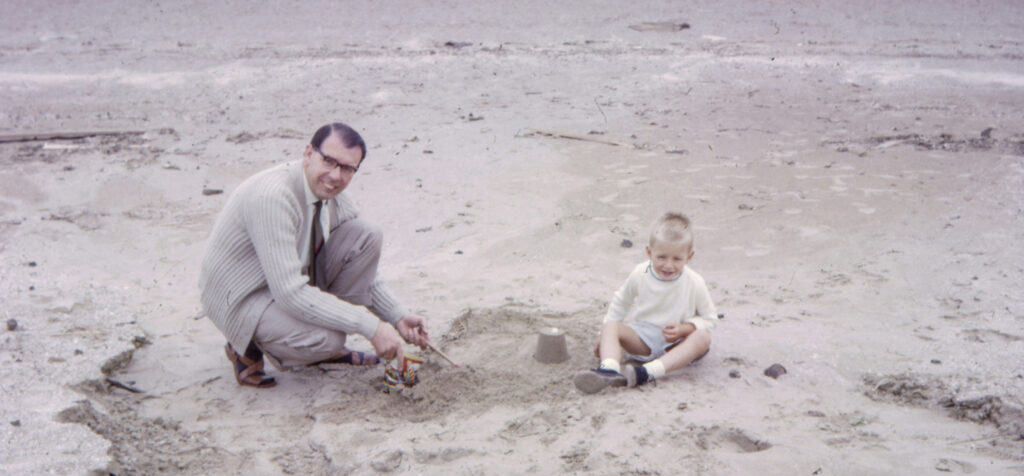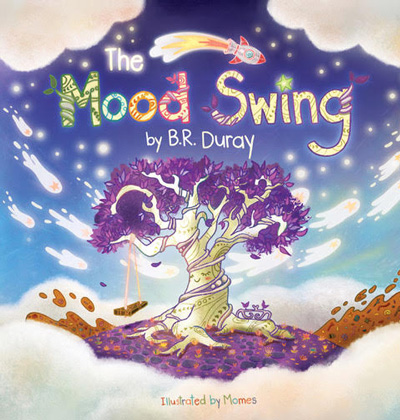
Estimated reading time: 6 minutes
Having lost his father during childhood, one man is moved to write a book to help other kids deal with the daunting emotions of grief
—
Grief comes in waves.When you lose someone you love—especially at a young age—it feels like you’re left forever standing at the shoreline of heartache. Some days, the tide is gentle, like wavelets brushing your ankles. Other days, it hits like a tsunami.
As an adult, you learn to expect the ebb and flow. You find ways to stay grounded, to move with the tide. The ups and downs. Loss gives depth and meaning to life. It helps to put all things into perspective. It’s—eventually—quite beautiful.
But as a child, when that first wave breaks, it’s different. You don’t know how to brace yourself. You’re pulled beneath the surface—disoriented, overwhelmed, unsure if you’ll ever make it back to shore.
When you’re a kid, you don’t have a map for emotions that big. You don’t know the waves will come and go—that you’ll survive the ups and downs. Stories, mentors, and moments of gentle guidance become like lighthouses. They don’t stop the storm, but they help you orient yourself.
I believe children are more emotionally intelligent than they’re often given credit for. They feel things deeply. They understand more than we think. But what children don’t always have is perspective.
When you’re young and in pain, you don’t know that time heals. You don’t know that the storm passes. That’s why guidance is essential—not just through parents and counselors, but through stories that act as guideposts through unfamiliar emotional terrain.
Stories give shape to the feelings you can’t name. They offer hope, connection, and perspective when everything inside feels lost and unfamiliar. That’s the gift of storytelling—and the reason I wrote The Mood Swing.
My father died when I was ten years old. He was a Major in the United States Army, a highly decorated member of Delta Force, and was buried with full military honors at Arlington National Cemetery—the 21 gun salute, the folded America Flag, the pall-bearing, and the military band. He was an American hero, having lived a life of bravery and service, but he was also my hero.
I’m 30 years old now, but 20 years ago, when I was a kid, with the fresh wound of his passing, I had no idea if the new feelings I was experiencing would ever go away. My hero was gone and the light had gone out in my life.
My mom did everything she could to give me strength and stability, but I was fighting an invisible war inside my own head—one I didn’t know how to talk about. At recess, I looked around and felt like my friends were living on a different planet: theirs, the happy one. Mine, the sad one.
My world had turned dark and gray. The sadness and anxiety were so constant, I remember thinking: Is this just how life is now? Every day felt heavy, like I was carrying something no one else could see and I had no idea if it would ever end. My grief counselor called it “The Blue.”
I actually didn’t understand the loss of my father for quite some time. I just remember being sad because everyone was sad around me. Sad for me. The most visceral part for me—the hardest part—was that I was terrified something would happen to my mom.
My grief manifested as anxiety.
If my mom didn’t answer the phone, I would spiral—calling her coworkers just to hear someone say, “She’s in a meeting, she’ll call you back.” My imagination took over, inventing all the worst-case scenarios: maybe she was in a car accident… maybe she got robbed at the gas station… maybe she was kidnapped.
My vivid imagination was cultivated in a battleground of fears.
Loss gives us curses, but we can turn them into superpowers. My active imagination that developed from anxiety after my dad died once fueled my nightmares, but now that same imagination fuels my dreams. Today I live in Los Angeles, where I make my living writing movies, books and directing films and television. The tools for my work as a writer and filmmaker were sharpened at this difficult time of my life without me even realizing it. The “curse” I felt from that early loss, became my superpower.
The Mood Swing is my first children’s story, my most personal project, and my love letter to all the kids whose hearts are hurting. To say: You’re not alone. It will get better. And that pain and emptiness you’re feeling… will one day be filled with something special, and become your greatest strength.
It took time, support, and an entire village to help heal my heart. To turn my curse into a superpower. Teachers, family, friends, and even other dads stepped in to guide me—often without knowing how much it meant. I also had stories. Stories gave me hope. Stories gave me language for the big feelings I didn’t yet understand. They were maps out of the quicksand I was stuck in.
That’s the ancient power of myth. Since the beginning of time, stories have been tools for healing—ways for elders to pass down wisdom, to help the next generation navigate what they’re going through.
That’s why books that help children explore and name big emotions matter.
That’s what I hoped to offer with The Mood Swing—a bit of comfort, a touch of whimsical magic, and ultimately a new way to think about loss. If even one child, sitting alone with sadness they don’t yet understand, can read The Mood Swing and feel a little less alone—then it’s done its job.
Grief continues to visit throughout my life—at milestones, in quiet moments—but it carries a different feeling now. Something quieter. Less shattering. It doesn’t take me under anymore. Now when I look up at the night sky and see the brightest, twinkling star, I think of my dad. I feel more connected to the Universe, and to the hidden magic fabric that connects us all.
You may also enjoy reading Everyone’s Okay: The Aftermath of Trauma When a Child Loses a Parent, by Reginald L. Reed, Jr.
